- Home
- Alex Berenson
The Night Ranger jw-7 Page 5
The Night Ranger jw-7 Read online
Page 5
Wells, who was one-quarter Muslim by birth, had taken Islam as his faith on his first mission for the agency, when he’d gone undercover in Afghanistan to infiltrate al-Qaeda. Over the years, his attachment to the religion had waxed and waned. His relationship with Anne fell outside its bounds. She wasn’t Muslim and they weren’t married. But his faith had returned in other ways in the last few months. He was praying every day, avoiding pork and alcohol. He’d even signed up to audit a class on Islam at Dartmouth, his alma mater, a way to learn more about the religion’s cultural and theological foundations.
“My stocking will be heavy with a Glock.”
“If you’re lucky.”
“You’re my Christmas present. Every day of the year.”
“Listen to you. Getting soppy.”
“The way to a man’s heart is through his trigger finger.” He rested a hand on her thigh.
—
The evening rush was done when they hit Boston, and Anne pulled up to the curb at Logan two hours before his flight. “Be careful over there. And come home quick.”
“I will. I love you.”
She pointed at her eyes, touched her heart, pointed at him. “Now go.”
He went.
3
NEAR THE KENYA/SOMALIA BORDER
Even with the hood blinding her, Gwen knew the others were close. The heavy black sack allowed only flecks of light, and Gwen wasn’t even sure if those were real or her imagination. But she heard Hailey humming tunelessly, Owen clearing his throat. More than anything, she wanted to see them. At least talk to them. But she’d learned her lesson.
—
Five days before, a few hours after they’d been brought here, wherever here was, a man warned them not to talk. She’d been hooded then, too. The drawstring was pulled tight around her neck, chafing, a constant wordless warning. She was in a hut, she knew that much, and her right hand was handcuffed to a chain that seemed to be attached behind her. They were left alone for a while, and then a man walked into the hut with heavy flat steps. Gwen thought he was a big man. Like Suggs.
“Nod if you can hear me,” the man said. The words seemed silly. Of course they could hear him. But Gwen nodded.
“Good. You don’t speak unless spoken to.” He had a soft British lilt, like lots of Kenyans. Gwen had always liked British accents. No more. “If you need the toilet, say toilet. Elsewise, you stay silent. Stay silent and we’ll take off your hoods. If not, they stay on. And I promise, they don’t get easier. We’re going to take care of you. Not hurt you. Do what we say and everything will be fine.”
He walked out with those heavy jailer’s steps. Gwen listened to him go like she could see with her ears. Then nothing. Someone murmured in a language she didn’t know. So much she didn’t know about this place. She wasn’t even sure whether night had fallen. The hut was hot and stifling, and the hood made judging the passage of time nearly impossible. She was exhausted but couldn’t sleep. A while later, she closed her eyes. She imagined Thanksgiving with her family, sitting in her aunt’s dining room, the house warm and bright. Outside, her cousins ran around playing football, tackling each other too hard. When she was thirteen, her uncle Conor nearly sliced off his thumb cutting the turkey. He’d been working hard, straining at the big leg joint, and the knife slipped away and cut into the webbing of his palm. He raised his eyebrows and grinned as the blood pulsed out. Gwen had been just old enough to notice that he’d topped off his scotch glass all afternoon. Her dad tied a dish towel around Conor’s hand to stop the bleeding and drove him to the St. Patrick emergency room downtown.
The kicker came the next year, when Conor brought out a new toy, a power carving saw. Her dad couldn’t lay off. You want to chop off your whole hand? Slow-cook it, serve it with the yams? Conor waved the saw like a baton and muttered about know-it-all doctors until her dad retreated to the living room to watch the Lions. Is he really going to cut off his hand? Gwen asked. Only if we’re lucky, her dad answered.
But now she wished she hadn’t thought about her family. Soon they’d hear about what had happened. She knew how desperate they’d feel. Three years before, her sister Catelyn had swerved for a deer on US 93, wrapped her RAV4 around a tree. She was put into a medically induced coma to relieve the swelling in her brain.
Gwen refused to leave Catelyn’s bedside for forty-eight hours, until her dad told her if she didn’t take a nap he would ask the docs to sedate her. All along she bargained silently with God—Let Catelyn live and I’ll go to church every week/never speed again/stop fighting with my mom/be a better sister. She couldn’t help herself, though she was certain that God didn’t make deals like that. And of course she hadn’t kept her promises, even though Catelyn came out of the coma four days after the accident and recovered completely.
Until now those days had been the worst of Gwen’s life. Her parents probably felt the same. But at least they had known Catelyn was being cared for and wasn’t in pain. This time, they wouldn’t have those certainties. They would be in hell, thanks to Gwen’s own foolishness. Let’s go to Lamu! What a great idea!
She wanted to cry, but she bit her lip so she wouldn’t. She had to control her emotions, focus on the reality of this place. She leaned against the rough brick wall, counted to one hundred and back to zero. Up and down and up and down. The air in the hut cooled. Her back ached and her legs cramped. Her belly was empty and her mouth was dry. They hadn’t given her any food or water. In the infinite darkness she pressed her lips tight and rasped her tongue against her teeth. Weirdly, she wasn’t scared. Not at the moment. She was sure she would be in the days to come. But for now she was just deeply physically uncomfortable.
She remembered her sixth-grade teacher, Edwin Granger, explaining the rule of three: three minutes without air, three days without water, three weeks without food. Granger had been teaching them state history, the Johnson party. The Johnsons were pioneers trapped by an early-season blizzard in the Bitterroots. They would have been Montana’s version of the Donners, only they got lucky and caught a thaw and found their way back to the plains.
The story stuck with Gwen in part because Granger had creeped her out so much. He had pockmarked skin and jet-black hair that she knew now must have been dyed. In September he treated her like everybody else. By June she couldn’t escape the way he looked at her. Fortunately, he didn’t try to touch her, never even said anything inappropriate. But his squinty blue eyes had stayed with her. Her first taste of unwanted male attention.
Granger lingered over the tale of the Johnsons. I want you all to understand the power of these mountains, he’d said. Gwen wasn’t impressed. Everybody in Montana knew that blizzards could hit the Bitterroots as early as in October. The Johnsons should have waited for spring. Instead, only the blind luck of a warm December saved them from their own stupidity. Otherwise they would have been sharpening axes like the Donners. What’s for dinner, honey?
Now Gwen knew what had happened to all the pioneers who hadn’t made it. One big mistake and then a couple small ones. For example, Let’s go to Lamu. Followed by Forget the main road. Just like that the wagons were stuck in axle-high drifts with the snow still coming. And all the Africans in the world couldn’t dig you out. Not in three days or weeks or years. Suddenly she was back in Granger’s class. She needed water, she was so thirsty. She raised her hand and said, I’ll do what you want if you just let me get a drink, whatever you want. He said, Wake up, but with a British accent. She tried to stand, only her hand was stuck in the desk—
She opened her eyes, but she was still in the dark. Nothing made sense. Then she remembered the hood. Strange to wake to darkness. Someone reached behind her neck. She twisted her head in panic. “Easy,” a man said, the same British accent she’d heard the night before. The drawstring loosened and the hood came up, the fabric rubbing her face—
And she saw. Until this moment, she hadn’t realized what a gift sight was. Even though all she saw was a windowless brick hut maybe twenty feet s
quare, lit by a battery-powered lantern that barely cut though the dirt in the air. The hut was warming. It must be morning, so somehow she’d slept for several hours. A coat of dust covered her tongue. Her joints were stiff and cramped from the hours against the wall. She felt like she’d been stuck in the worst seat in coach on the longest flight of her life.
At least their kidnappers hadn’t split them up. The others already had their hoods off. Scott sat against the back wall, with a nasty purple bruise on his cheek from the beating he’d taken during the kidnapping. He caught her looking at him and winked. She thought she’d imagined it. Then he winked again. Had to prove how cool he was. A frat boy to the end. Gwen knew she should be furious with him. This trip had been his idea. Still she was glad to have him. She felt somehow that nothing too terrible could happen with him here.
Owen sat directly across from her. He smiled when he saw her looking, but the grin felt forced. Painted on, by the worst painter alive. She hoped he wouldn’t do anything dumb to prove that he wasn’t afraid. Hailey was closest, a couple feet to her left. She gave Gwen a half-nod, nothing more.
They were all held the same way, their right hands chained to posts set in the walls about eighteen inches above the mud floor. The chains were maybe four feet long, so they had some flexibility to move. They could even stand. And Gwen was relieved to see that the kidnappers had set bottles of water beside each of them, the big two-liter kind.
Still, the hut was miserable. A musky smell filled the room, not just sweat but something richer, murkier. She had noticed it in African men before. Pre-kidnapping Gwen would have wrinkled her nose and walked straight out. But new Gwen could already imagine a place worse than this. A shorter chain. A hood that never came off. Worst of all, being alone.
Finally, Gwen focused on her captor. As she’d guessed, he was a big man, six feet tall and heavy. Fine. And wearing a disguise, a full-face Joker mask. She understood that he didn’t want them to recognize him. But she couldn’t imagine why he’d chosen this particular mask. She wasn’t sure she wanted the answer, either.
“You see the water beside you,” he said. “Drink it carefully. It’s all you get for the day.”
“What about food?” Owen said.
Gwen didn’t know whether Owen had forgotten the warning about speaking or simply wanted to test its limits. Either way, he’d made a mistake. The Joker squatted beside Owen, grabbed the water bottle. And then carefully, deliberately, unscrewed the cap and stood and tipped the bottle over. Gwen couldn’t have imagined how closely she could focus on such a simple act. The stream of colorless liquid flexed thick and thin as it poured out of the bottle’s plastic mouth. Inside the container, air bubbles rose and popped. Gwen felt herself reaching with her free left hand for her own bottle, feeling its heft. Three days without water. Did that rule apply in a hut that would be a hundred degrees by the afternoon?
When the Joker stopped pouring, the bottle was still half-full. Owen shook his head, stared at the floor. The Joker set the bottle down. He seemed to smile behind his mask, though Gwen couldn’t be sure.
“You can live a long time without food. As my people will tell you. Months. Water is what you need. I hope I don’t have to explain again. No speaking unless spoken to. I’ll see you tomorrow. Don’t be late.” He laughed, a rich velvety sound, Oh-oh-oh, and walked out.
This man was enjoying himself, Gwen thought. He was performing, the surest sign of his power. He didn’t care that they hated him. He knew they would have to choke down their hate. She saw now: This was what it meant to be powerless. Something else, too: The refugees must feel this way all the time.
After a while they reached for their bottles, sipped in silence. Casually, Gwen checked out the guard. He sat beside the black blanket that covered the doorway on a cheap plastic chair that slumped under his weight. He was young and rangy and tough. Scott, with his pumped-up arms and thousand-crunches abs, might have had a chance against him. If Scott weren’t chained to the wall. If the guy didn’t have a pistol in his hip holster.
For the next three days, the hoods stayed off, and every morning they got two liters of water.
—
Then they made a mistake. Gwen made a mistake.
She was sure Sunglasses was asleep.
Three guards watched them in shifts. The overnight guard wore wraparound sunglasses and was the nastiest of the three. He didn’t speak, not even hello or good-bye. He didn’t like to be bothered about the bathroom. Maybe he was just angry that he’d drawn the overnight shift. Gwen called him Sunglasses. Not out loud, of course.
On that fourth day of captivity, Gwen decided she needed to talk to Hailey. They were all in the same room, and yet the others might as well have been a thousand miles away. So she held her pee the whole afternoon and evening. By the time Sunglasses came in, she couldn’t think about anything except how much she had to go. Sunglasses checked their chains, as the guards did each shift. Then he went to his chair and dimmed the electric lantern. Gwen closed her eyes and waited, counting to one thousand and back down. She was sure she would have fallen asleep if not for her aching bladder.
Finally, she opened her eyes. She felt wrung out and empty. When she moved her head, she saw streaks of red and white, like her brain couldn’t keep up with her eyes. She hadn’t known until now that she could be this tired and still be awake. The others were quiet. Gwen looked at Sunglasses. He slumped in his chair, legs kicked out, arms loose. His breathing was slow and deep. He was out.
Still, she counted another five hundred. Her heart pounded so loudly she had the crazy fear it might wake everyone in the room. Finally, she leaned toward Hailey, making sure her chain didn’t clank. For a second, less, she hissed, the sharp ugly sound that she and Hailey used at crowded parties to get each other’s attention.
Hailey opened her eyes. Pure 200-proof panic filled her face and then she focused on Gwen. “Hailey.”
Hailey raised a finger to her lips.
Gwen nodded at the chair where Sunglasses slept. “He’s out.” She realized that she’d been so focused on getting to a moment where she could speak that she hadn’t thought about what to say. “How are you?”
Hailey shrugged. Like, You woke me to ask me that? She was right, too. Sick or well hardly mattered.
“Better question. Did Suggs set us up?”
Suggs had been taken with the rest of them, but they hadn’t seen him since. Maybe the kidnappers had killed him. Or maybe he was working with them. Scott was the only one who knew him at all, and even Scott probably knew less than he thought.
“If we’re lucky.”
Gwen shook her head: I don’t understand.
“It’ll give the police a lead. Also he can reach out to James, make a deal. WorldCares can pay these guys off, get us back quietly.”
As usual, Hailey was a step ahead of her.
“Think we’re still in Kenya?”
“No idea. I hope so. Same reason.”
“Me, too.” Somalia seemed like a whirlpool, sucking down everything that came its way. “Are you scared?” As soon as Gwen said the words, she knew the question was the real reason she’d woken Hailey.
Who didn’t hesitate. “Of course not. I’m counting my money from the book deal we’re gonna get. Now, hush before you wake our buddy.”
For the first time since they’d been taken, Gwen felt they might be all right. Then she heard a rustling. She opened her eyes to see Sunglasses standing. The guard turned the lantern all the way up and reached for his chair and slammed it against the floor until the cheap plastic split down the middle. He stepped close to Gwen and tore off his sunglasses and tugged on her chain until her arm twisted painfully behind her. A forest of red veins covered his eyes. No wonder he wore the wraparounds. Gwen hated and pitied and feared him all at once. She forced herself to hold his gaze.
He grabbed the lantern, stalked out of the hut. The darkness was absolute.
“Sorry,” Gwen whispered. “I’m sorry.” No one ans
wered.
—
A few minutes later, Sunglasses returned with the Joker, who wore a loose white gown that looked like something her grandmother might wear. Gwen hoped they lived through this just so she could tell her family about this moment, about their captor, a three-hundred-pound man in a nightie and a Halloween mask. He knelt beside Gwen, squeezed her arm. His hand circled her skinny biceps easily. “Do you know why we don’t feed you?”
Gwen shook her head.
“Answer me.”
“To punish us, I guess.”
“No.”
“So we know what it’s like to be hungry.”
“Wrong again. Because if you’re hungry and weak, you won’t make trouble. If you fight, try to escape, I may have to hurt you. I don’t want to do that. You’re worth more undamaged. Understand?”
She nodded.
“I would have given you a decent meal tomorrow. Another day or two, I might have let you talk. You’ve spoiled that. You’ve broken the only rule I gave you. Woken me in the middle of the night.” He shouted something in Swahili and Sunglasses walked in, holding the hoods.
He turned to Gwen. “Meshack here says that you spoke the most by far. So you must have a hood.” He looked away from her, at the others. “But as for you three, you have a choice. Wear the hood. Or sit without one and watch her suffer.”
Gwen held herself silent. She was sure that any objection would only anger him. He had chosen the penalty perfectly. The other three already blamed her for getting them in trouble. Now the Joker was forcing them to choose between their sight and their honor.
Hailey raised her hand first. After that, the other two had to follow. Gwen watched as the Joker pulled the black bags over their heads. Then her turn came. She bent her neck forward. The Joker pushed up her chin and stroked her face with his hand, and she bit her lip to keep from screaming. He grabbed her long blond hair and pulled it back. She closed her eyes.
When she opened them again, the world was dark.

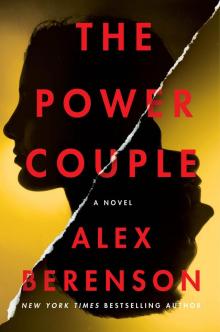 The Power Couple
The Power Couple The Counterfeit Agent
The Counterfeit Agent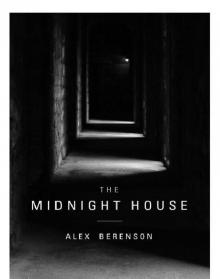 The Midnight House
The Midnight House The Prisoner
The Prisoner The Ghost War
The Ghost War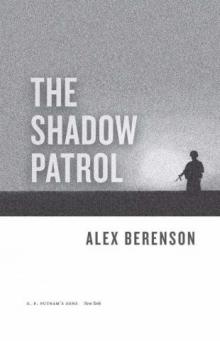 The Shadow Patrol jw-6
The Shadow Patrol jw-6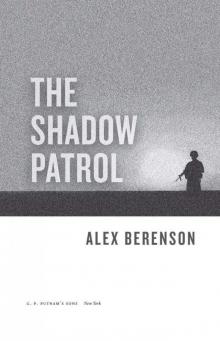 The Shadow Patrol
The Shadow Patrol The Deceivers
The Deceivers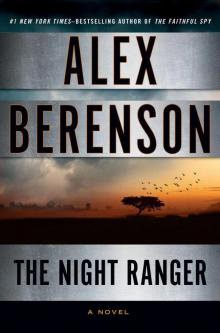 The Night Ranger jw-7
The Night Ranger jw-7 The Faithful Spy
The Faithful Spy The Prince of Beers (Kindle Single)
The Prince of Beers (Kindle Single)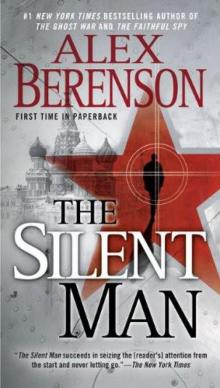 The Silent Man jw-3
The Silent Man jw-3 The Silent Man
The Silent Man The Wolves
The Wolves The Midnight House jw-4
The Midnight House jw-4 The Ghost Agent
The Ghost Agent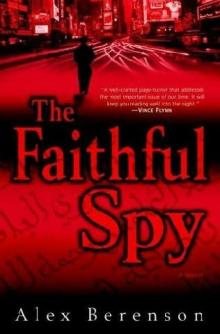 The Faithful Spy jw-1
The Faithful Spy jw-1 The Prince of Beers
The Prince of Beers Twelve Days
Twelve Days The Secret Soldier jw-5
The Secret Soldier jw-5 The Ghost War jw-2
The Ghost War jw-2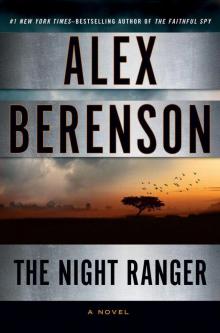 The Night Ranger
The Night Ranger